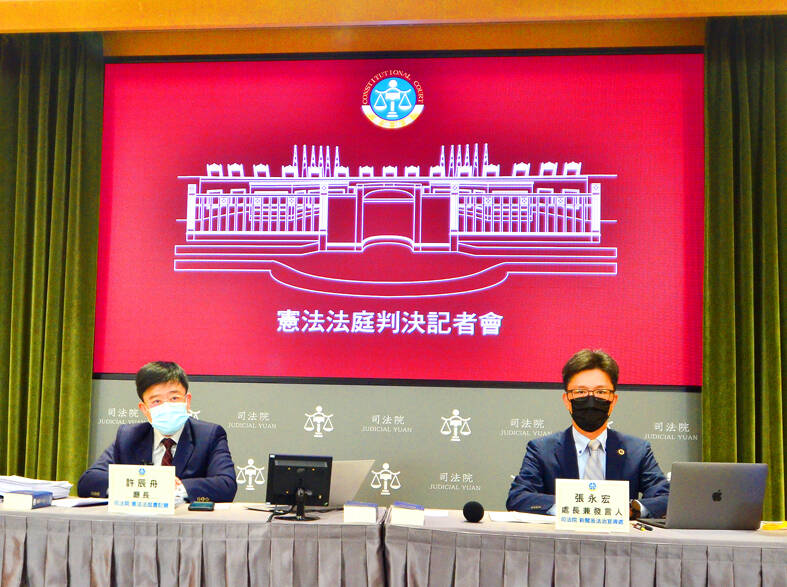The Constitutional Court yesterday ruled that the government may seize US$480 million from accounts belonging to the estate of late arms dealer Andrew Wang (汪傳浦) by retroactively applying property seizure rules that were amended in the Criminal Code in 2016.
The decision threw out a constitutional challenge by Wang’s wife, Yeh Hsiu-chen (葉秀貞), Wei Chuan Foods Corp and other parties to the legal application and property confiscation rules stipulated by the Criminal Code’s articles 2, 38 and 40.
The verdict of Constitutional Case No. 18, 2022 establishes the principle that confiscating criminal proceeds is a restorative measure that gives assets back to their rightful owners, instead of a punishment for the guilty, Chief Justice Hsu Tzong-li (許宗力) said.

Photo: Wang Yi-sung, Taipei Times
This means the government did not breach the Constitution’s protections against ex post facto laws, which prohibit the retroactive application of punitive measures, but do not prevent the implementation of restorative measures, Hsu said.
The plaintiffs cannot lay claim to the breach of their legitimate expectations as a third party because they had accepted criminal proceeds in bad faith, he said.
The amendments to property confiscation rules stipulate that illicit gains should be confiscated according to the law at the time of judgement, not the crime’s commission, and that the property of a third party could be seized if they had acted in bad faith.
Wang was a central figure in the Lafayette frigate procurement scandal.
He fled Taiwan on Dec. 20, 1993, days after the body of navy captain Yin Ching-feng (尹清楓) was found in waters off the east coast.
Yin was reportedly a whistle-blower who had planned to report graft and siphoning of funds by people involved in the deal.
Prosecutors in 2006 indicted Wang on charges of bribery, money laundering and other crimes.
He reportedly died in the UK in 2015, leaving a sizeable inheritance to his family in accounts held mainly in Swiss banks.
Yeh, who was also indicted in connection to the scandal, is living abroad as a fugitive and filed the case by proxy.
Wei Chuan Foods joined the lawsuit to avoid the seizure of NT$32.9 million (US$1.07 million) in assets after company chairman Wei Ying-chung (魏應充) was found guilty of selling tainted food oils.
A court found the company liable for the scheme a few months before the amendments passed in 2016.

A preclearance service to facilitate entry for people traveling to select airports in Japan would be available from Thursday next week to Feb. 25 at Taiwan Taoyuan International Airport, Taoyuan International Airport Corp (TIAC) said on Tuesday. The service was first made available to Taiwanese travelers throughout the winter vacation of 2024 and during the Lunar New Year holiday. In addition to flights to the Japanese cities of Hakodate, Asahikawa, Akita, Sendai, Niigata, Okayama, Takamatsu, Kumamoto and Kagoshima, the service would be available to travelers to Kobe and Oita. The service can be accessed by passengers of 15 flight routes operated by

GIVE AND TAKE: Blood demand continues to rise each year, while fewer young donors are available due to the nation’s falling birthrate, a doctor said Blood donors can redeem points earned from donations to obtain limited edition Formosan black bear travel mugs, the Kaohsiung Blood Center said yesterday, as it announced a goal of stocking 20,000 units of blood prior to the Lunar New Year. The last month of the lunar year is National Blood Donation Month, when local centers seek to stockpile blood for use during the Lunar New Year holiday. The blood demand in southern Taiwan — including Tainan and Kaohsiung, as well as Chiayi, Pingtung, Penghu and Taitung counties — is about 2,000 units per day, the center said. The donation campaign aims to boost

ENHANCING EFFICIENCY: The apron can accommodate 16 airplanes overnight at Taoyuan airport while work on the third runway continues, the transport minister said A new temporary overnight parking apron at Taiwan Taoyuan International Airport is to start operating on Friday next week to boost operational efficiency while the third runway is being constructed, the Ministry of Transportation and Communications said yesterday. The apron — one of the crucial projects in the construction of the third runway — can accommodate 16 aircraft overnight at the nation’s largest international airport, Minister of Transportation and Communications Chen Shih-kai (陳世凱) told reporters while inspecting the new facility yesterday morning. Aside from providing the airport operator with greater flexibility in aircraft parking during the third runway construction,

American climber Alex Honnold is to attempt a free climb of Taipei 101 today at 9am, with traffic closures around the skyscraper. To accommodate the climb attempt and filming, the Taipei Department of Transportation said traffic controls would be enforced around the Taipei 101 area. If weather conditions delay the climb, the restrictions would be pushed back to tomorrow. Traffic controls would be in place today from 7am to 11am around the Taipei 101 area, the department said. Songzhi Road would be fully closed in both directions between Songlian Road and Xinyi Road Sec 5, it said, adding that bidirectional traffic controls would